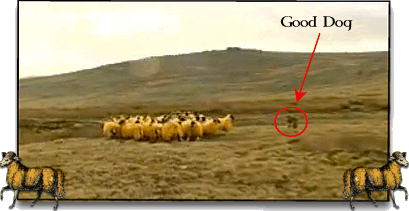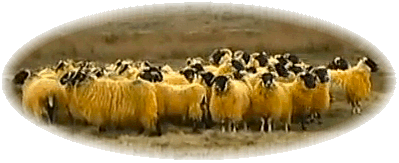
Dartmoor can boast many strange animals both real and fictional, over the past few years we have had the ‘beast’ of Dartmoor, piranha fish and now there are orange sheep. On Thursday (14.04.2011) I called in at the Little Chef near Okehampton and met a sheep farmer who asked me what I thought of the ‘Orange Sheep’ that were grazing up on the nearby moor. As it was only 11.00am and the nearby pubs had only just opened it seemed possible that this statement was not the result of too many ciders. It transpired that the breaking news of the day was a report on BBC’s breakfast news about Mr Heard, a Dartmoor farmer who had dyed all his sheep orange. The guy who I was talking to found this particularly amusing especially the fact that the news report had dramatically increased the value of Mr Heard’s sheep dog. When asked, ‘why’, I was told that during the report the dog had done a splendid job of working the sheep and ensuring they stayed in a tight group which acted as the backdrop to the interview.

As novel as orange sheep may sound there is a serious reason why this was done which is not only confined to Dartmoor and that is to prevent sheep rustling. Despite stringent rules on sheep identification the problem of sheep theft is a growing concern up and down the country and is said to be the third biggest rural crime in Britain today. Over the past few years just Mr Heard’s farm alone has lost around 200 sheep valued at about £120 each and this is but one of many such cases. You do not have to look far to see why, currently Tesco are charging £11.67 a kilo for a leg of lamb, with an average target carcass weight of 19.5 kg per lamb it means there is easy money to be made by selling meat on the black market. It is not just the loss of the sheep’s meat value that effects farmers, in some cases the animals that are being stolen are replacements for the following years breeding stock. This basically means that to maintain the flock numbers new ewes will have to be purchased thus adding another cost to the theft.
However, it is not only the financial losses to the sheep industry that are of concern there is a public health issue as well. It is a known fact that the average sheep just simply wants to die, therefore there are a huge range of vaccines, wormers, dips etc that are used to keep them alive. Everyone of these products has a meat withdrawal period which basically means that a sheep farmer must not sell his animals for meat until the stipulated time has passed. The reason these withdrawal times are set is to ensure that there are no chemical residues still meat which could end up in the human food chain. On farms where they still use the traditional dips to control parasites the sheep will be plunged into a bath which contains Diazinon. Once the sheep have been dipped they must not be sold for slaughter for 70 days which is perfectly safe as long as the withdrawal period is observed. Whoever is stealing the sheep will have no idea if any such products have been recently used and if there is a risk of chemical residues still in the animal. Quite frankly I doubt if the thieves even care as long as they can make their ill-gotten gains, likewise whoever ends up selling the ‘cheap meat’.
So back to the ‘Orange Sheep’ of Dartmoor, the whole idea of dying them is to deter any would-be thieves from stealing them because they are easily identifiable, especially with all the media coverage this flock has now acquired. Unfortunately this cannot work for every sheep farmer as firstly there are not enough individual colours to go around and secondly if a sheep were dyed who would know which had been stolen.

So what can the public do to help eradicate this problem? Firstly to report any suspicious activity around flocks of sheep, the thieves will need dogs to round them up and lorries to take them away. Therefore if such things are seen especially at night there is a good chance something is amiss and the police need to be contacted immediately. In the event of it being a genuine case of sheep handling I am sure the farmer would rather be questioned than lose his stock.
A way of reducing the risk of buying stolen meat, which may be contaminated with veterinary drugs is to ensure that somewhere visible is the ‘Red Tractor’ symbol (see opposite). Any meat with this logo can be traced from farm to shop and has been checked at every stage of this journey and can be guaranteed to have met all required standards, therefore the likelihood of it being black market meat is minimal.
Sheep rustling is by no means a new concept of Dartmoor, for centuries such thefts have occurred and some of them have gone down in legend (see: Samson Bow page) and others have simply been recorded in court hearings. The main difference in these modern times is that once caught the culprits are no longer taken to the gallows as used to be the case. Maybe this along with ‘Orange Sheep’ would be the answer, I am sure that every sheep farmer who has suffered losses would agree.
So if ever you are walking around the Sourton Tor area and you see a flock of orange sheep, they have not been tangoed it’s simply Mr Heard’s flock of sheep and it also means they have not been stolen.
 Legendary Dartmoor The many aspects past and present of Dartmoor
Legendary Dartmoor The many aspects past and present of Dartmoor
